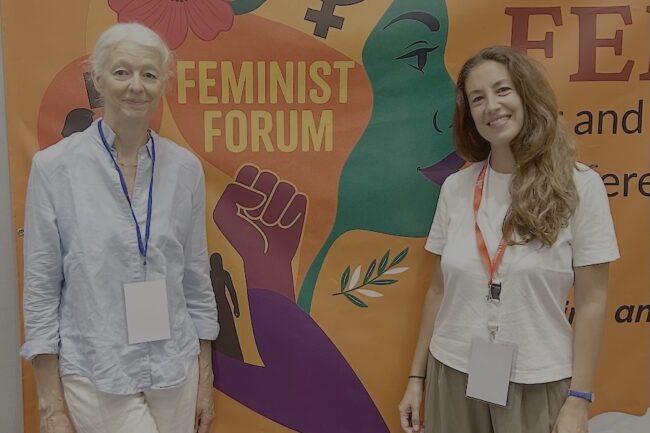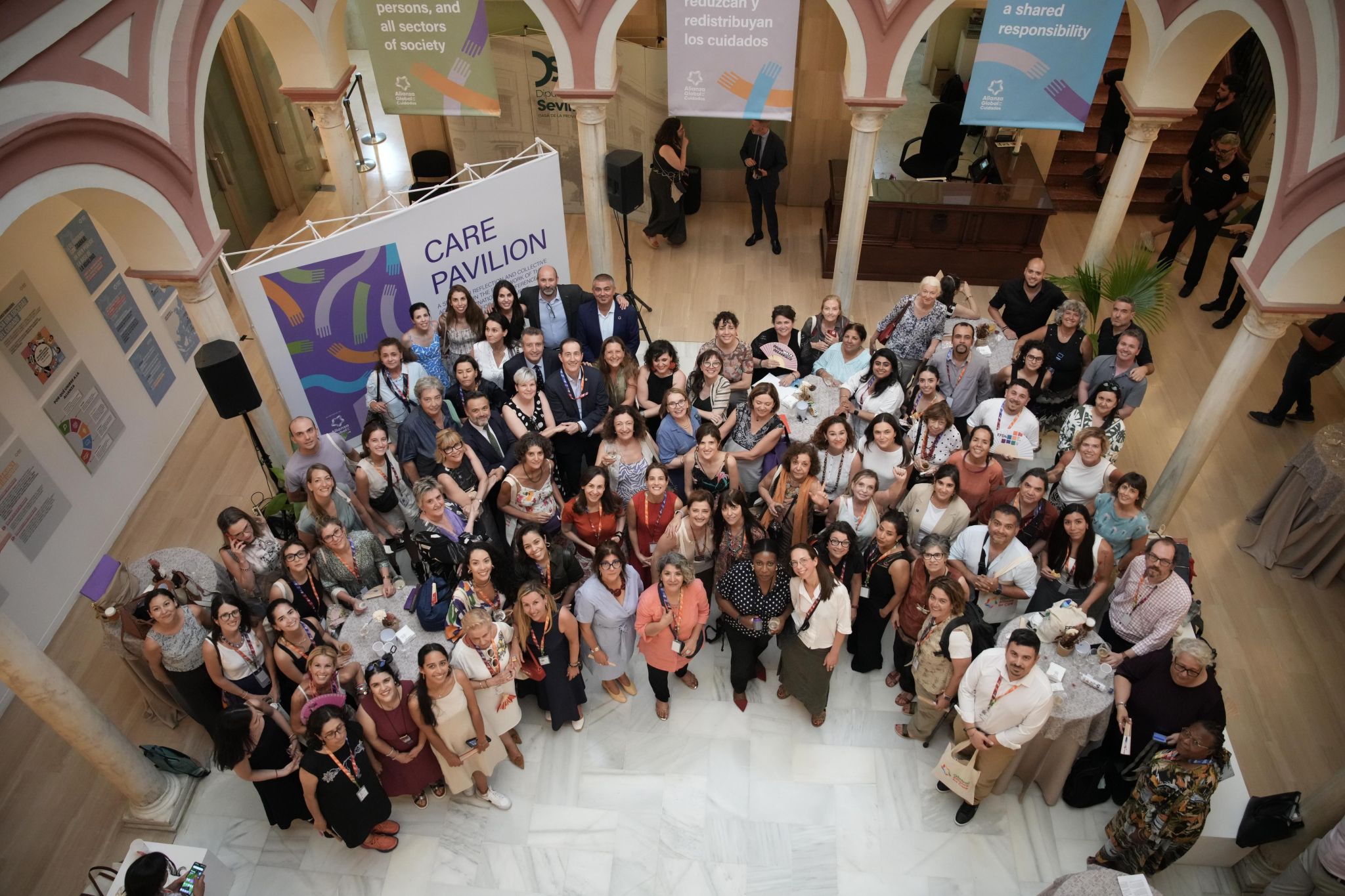Financing for development: time to invest in Care and Wellbeing
06.07.25
From 30 June to 3 July, Make Mothers Matter was in Sevilla, Spain, for the 4th UN International Conference on Financing for Development (FfD4). Here’s a look back at this major UN event and the key takeaways we brought home.

Although Financing for Development does not seem closely related to our mission on advancing the rights and recognition of mothers, the topics discussed under this framework, including taxation, debt, trade, and more generally macro-economic policies do matter for mothers as they directly impact governments’ ability to mobilise domestic resources to invest in social protection and in essential public infrastructure and services–which are essential for women, in particular when they are mothers.
Those connections were largely discussed at both the Feminist Forum and the Civil Society Forum which took place just before the Forum in Sevilla and in which MMM participated. They are more relevant than ever in the context of the poly-crises we face, including a major debt crisis and increasing pushback against women’s rights.
MMM photo exhibition shows need for greater investments in Care
MMM was also present in Sevilla with an exhibition at the Care Pavillon set up by the Global Alliance for Care in the historic centre of Sevilla.
Our exhibit featured a selection of photos from the Portrait of a (Working) Mother series, an interdisciplinary project initiated by Marina Cavazza, photographer, and Eglė Kačkutė, scholar, that weaves together photography and narrative to explore motherhood, career, and international mobility, and highlights the lived experiences of mothers raising children while building a professional and family life.
These photos–and the stories behind them–were used to illustrate some key finding of our State of Motherhood in Europe Survey, echoing what 9’600 European mothers are saying about motherhood and the need for greater investment in care.

Our take on the Sevilla Commitment and FfD4 outcomes
The 41 page Sevilla commitment (or Compromiso de Sevilla) clearly falls short of any significant breakthrough to change the system and reform the screwed and unjust global financial architecture. It is rejected by most civil society organisation working on the issues of taxation, debt and trade as insufficient in the face of the major poly-crisis that the world face today.
In particular, the FfD4 outcome document falls short of addressing the debt crisis and lacks any hint of commitment to establish a UN Framework Convention on Sovereign Debt as long advocated by civil society. It merely acknowledges the need for reforming the current structurally unjust international debt architecture, which sustains this debt crisis, but does not offer much concrete proposal of reform.
Still, however weak, there IS an outcome document, and it does include a few key positive elements that concerns mothers.
Financing for development is also investing in care and social protection
In particular, UN Member States did commit to “increase investment in the care economy and recognise, value and equitably redistribute the disproportionate share of unpaid care and domestic work done by women.”
While this does not seem much, we at MMM welcome this commitment, the very first time that a call to address the unequal distribution of unpaid care work is made as part of a Financing for Development framework.
Similarly, the Sevilla commitment promotes social protection–including social protection floors–as an investment and a key element of a national development strategy. It also offers support for developing countries that commit to increase social protection coverage by at least two percentage points per year, an important step to address the current reality that nearly half of the global population lacks any form of social protection, and that 41% of new mothers do not receive any maternity protection benefit.
Moving ‘Beyond GDP’ gains momentum
FfD4 is not an end, and the conference also resulted in a number of announcements and proposals to move forward, as part of the Sevilla Platform for Action.
Among these, Investing in care for Equality and Prosperity: A Global Initiative to Advance Gender-Responsive Financing for Development, is a initiative led by Governments of Brazil, Colombia and Mexico, UN Women and the Global Alliance for Care, that we will closely follow.
Also connected to our work, the Coalition of the Willing on Beyond GDP was launched as a global alliance of countries and partners focused on integrating more comprehensive metrics of development into policy and financing practices, moving beyond the sole focus on GDP.
Beyond GDP refers to the growing recognition that Gross Domestic Product (GDP) alone is an insufficient measure of societal progress and well-being. It does not include the costs that unpaid domestic and care work has for women–in particular mothers, nor the costs of the environmental degradation, climate change and biodiversity loss that the narrow focus on GDP growth has caused.
This discussion is important because it will redefine what progress and development success is; and it aligns with our advocacy work on the need for systemic transformation to wellbeing economy, i.e. to an economy in service of life. It is also important for mothers who perform the bulk of unpaid domestic and care work, invisible and unrecognised.
MMM will therefore actively follow and participate in these upcoming beyond GDP discussions to ensure that the new system recognises the economic and social contributions of mothers and adequately support them in their different roles.
The UN FfD4 conference was a great opportunity to learn about FfD issues and how they affect women, in particular when they are mothers, in their everyday lives, concerns and prospects, through the lens of care. It was also a great opportunity to strengthen connections, notably with members of the Global Alliance for Care and the Global Coalition on Social Protection Floors of which we are members, and build new ones, in particular with organisations working to advance women’s rights in Latin America and in Africa.

See also:
The New EU Gender Equality Roadmap : A Call for Inclusion of Mothers
04.03.25
The European Commission’s initiative on a new Gender Equality Roadmap post-2025, marks a significant step forward in addressing gender disparities across the European Union. Make Mothers Matter (MMM
Breaking the Cycle: Gender Equality as a Path to Better Mental Health
18.03.25
The Council of the European Union has taken a decisive step in recognising the vital connection between gender equality and mental health.
Europe Must Listen to Mothers: Our landmark report heads to the European Parliament
28.08.25
On 22 September 2025, the voices of mothers will take centre stage in Brussels. For the first time, Make Mothers Matter (MMM) will present its State of Motherhood in Europe








